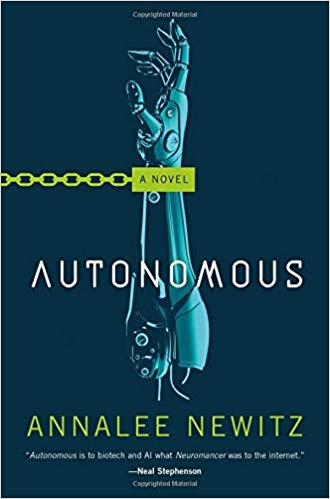One hundred years from now, the United States has collapsed. Big Pharma is more powerful than most governments. Robots are as intelligent as people. It is in this world that Judith “Jack” Chen survives as a pirate, making illegal versions of drugs to sell to those that can’t otherwise afford them.

In this world, Big Pharma has made life “better” for those on the top. Drugs exist that can keep you young, can make you more productive, and can heal wounds. Biotech has also led to the ability to “paint” roads as needed. Most technologies are biogegradable — “somebody had left a throwaway mobile which was now biodegrading into a lump of gray cellulose.” Robots are indeed smart, so smart that they’ve been given the same rights as people. But, as courts decided that robots still could be “indentured,” they also decided that people could, since they are no smarter. A new form of slavery emerges. Autonomous, by Annalee Newitz, explores this world through the adventures of Jack, who has reverse engineered a new drug that has some nasty side effects. Once her drug gets out there, she tries to stop it, any way she can.
Autonomous explores themes relevant for our own times. What is the meaning of freedom? Both literally, in the form of actual bondage to another person, and more abstractly. In a world where the rich can stay perpetually young with their designer drugs, what chance does anyone else have of ever breaking out of the bottom? If drugs exist that can enhance your abilities, make you work better and more efficiently, what choice do the rest of us have but to take them? If big companies control these drugs, what hope do any of us have against being beholden to their demands? Many of these questions we grapple with now.
Take for instance, performance enhancing drugs. We are most familiar with steroids, and athletes who use them both to get a leg up and to heal faster. If all of the other football players are using them, how can a guy not be tempted to follow their lead, to ensure he is on the same playing field in terms of base level of talent? I’ve often wondered, if there was a drug that made me smarter and better able to do my job, would it almost be an obligation to take it? Wouldn’t it be in my employer’s best interest? In my family’s?
At the same time, as such drugs are developed, they are owned, by big multinational corporations. This is exemplified by GMOs. I’m not at all against GMOs from a scientific or health point of view. Humans have been modifying the food they eat for millennia, so little of the food we eat is “natural.” No, to me the bigger issue is who then controls the food supply. If companies own the rights to the genetic material, and we rely upon that material, we lose control of how to grow our own food. And, the next step is that they own more and more genetic material, not just of corn and wheat, but of animals, including people. Where does it end? Who fundamentally owns the “rights” to the DNA structure of humans? What happens when “every living thing and idea [is converted] into property?”
In the world of Autonomous, the emergence of intelligent artificial life raises new questions about freedoms. Robots are smart and are aware. But, people still want them to work for them. So, they are kept indentured, or as slaves, effectively. However, there are pockets where robots are “born” free, raised autonomous. One character is just such a robot, and she struggles with identity issues: “How could she understand them [indentured robots], when she’d always been autonomous? She felt like her bot identity was incomplete without that seminal experience.”
Autonomous doesn’t delve deeply into these questions. By creating a world in which these issues have become part of the fabric of life, Newitz has the freedom to tell her adventure story within the backdrop of this world, touching on these questions through her characters. I’ll admit, it took me a while to get into the story, but once I knew the characters and the setting of the story, it flowed a lot better. Newitz raises questions that already face us and will only become bigger issues as we go forward.